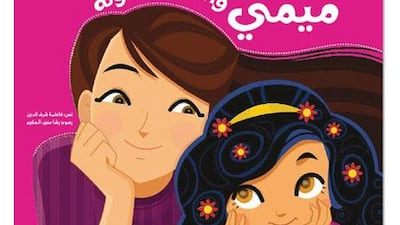The Arab world has a rich, centuries-old historic tradition of aural storytelling. Adults told each other stories around desert campfires and parents invented stories to help their children fall asleep at night. For this reason, children's books written in Arabic are more of a modern product - one that was not produced in any kind of high-quality format.
Recently, however, higher-quality children's books are coming on to the market, bringing with them a renewed push for children to read in their mother tongue.
The aural Arab tradition of storytelling is one of the reasons that children's books in Arabic have not been prolific in the past.
"Our great-grandparents told stories and they didn't necessarily read, so we've not had reading in our culture," says Sheikha Bodour bint Sultan Al Qasimi, the founder and owner of Kalimat Publishing, Sharjah. "It takes time for people to adapt to this change."
Sheikha Bodour established Kalimat in 2007, after not being able to find any good-quality children's books in Arabic on the shelves for her own children. Her daughter, in particular, found the available books boring and so preferred to read English titles.
In 2009, Sheikha Bodour, daughter of the Ruler of Sharjah, founded the Dh1 million Etisalat Prize for Arabic Children's Literature. The prize will be announced during the Sharjah International Book Fair, which starts tomorrow and runs until November 26.
More than three years later and Kalimat has published 75 books, won numerous awards and distributes titles across the Arab world.
"There are lots of factors that make children's books good in Arabic: the story has to be interesting for children and illustrations play a big role," Sheikha Bodour says.
For Isobel Abulhoul, the director of the Emirates Airline Festival of Literature, story, humour, illustrations and morals within a story make for a good children's book.
"All good children's stories have to have a moral … but it has got to be done in such a way that it's not obvious and good should always overcome evil," she says. "That's a really important message in any children's book."
Not only should illustrations almost tell the story independently of the words, but the story should be global - to appeal across continents - and also be appealing to adults as well as children, she adds.
According to the mother of five, there are four main problems with publishing children's books in Arabic: a lack of emphasis on humour in titles; regional printing resources; a perception that books in Arabic should be cheap and the key issue of authenticity of language use.
"A child only grows up knowing what they speak and what they hear," Abulhoul says of colloquial Arabic versions found across the Middle East. "But you can't write books in that language. If we can imagine, for example, if Roald Dahl had written in Chaucerian English and that was our first experience of a book, how challenging would it be? We wouldn't understand the words, it would sound slightly false and we wouldn't be able to identify with it."
While Kalimat publishes in formal Arabic, also called Modern Standard Arabic (MSA), its titles incorporate words and emotions familiar to children, to make them more appealing.
"Language affects children's thought and emotions and there's a rigid, formal language in books. The gap between the colloquial and classical plays a big part in why children are not picking up books," Sheikha Bodour says.
"My publishing house is trying to make that gap as small as possible … so we try to make words and stories as close to children's experiences as possible."
The difficulties with the language found in children's books is also not just due to colloquialisms, but general formal terms used that may prove unfamiliar for young children, according to Yolande Abi-Aad, the head of the Arabic Department at the Eton Language Institute.
"Even for [native] Arabic-speaking children, the language is difficult, because it's not spoken at home. You might find the word 'mother' [in a children's book] but not 'mummy'," she says.
"It's hard to compare it to the English language, but you might see phrases like 'this is Bob's mother', rather than 'this is Bob's mummy'.
"You don't get child-friendly books."
However, Wafa Tarnowska, author of children's books Dances with the Gods, The Seven Wise Princesses, Atlas of Arabia and the Rest of the World and the award-winning The Arabian Nights, has noted a shift in the language being used.
"The language used in Arabic children's books used to be difficult and formal and there are still some publishers that operate in this old way instead of writing in the language that children enjoy," she says, from London.
"However, more and more children's writers are now using language that is more humane and fun, closer to colloquial Arabic or what children hear at home … there's definitely a shift," she adds.
While the author has spent 13 years writing in English, but translating other works in Arabic, she has now taken the decision to write in Arabic alone.
Although there has been a perceived increase in the number of good-quality children's books published in Arabic, father-of-two Loay Nasser, a Jordanian living in Abu Dhabi, said the offerings are still lacking.
"The quality of English books is much better than Arabic books - and the quantity is more as well," he says.
His daughter, who is in grade three, reads only English books - "she doesn't like reading Arabic books".
For Sheikha Bodour, publishers have increased their focus on producing Arabic children's books but it's not being reflected in bookshops.
"I've definitely seen more publishers noticing a lack of children's books available and they've made an effort there," she opines.
"What I'd like to see now is the booksellers and bookshelves making an effort. Especially here in the UAE.
"This shouldn't be a one-sided effort, but a community effort.
"Booksellers have to respond to this."

